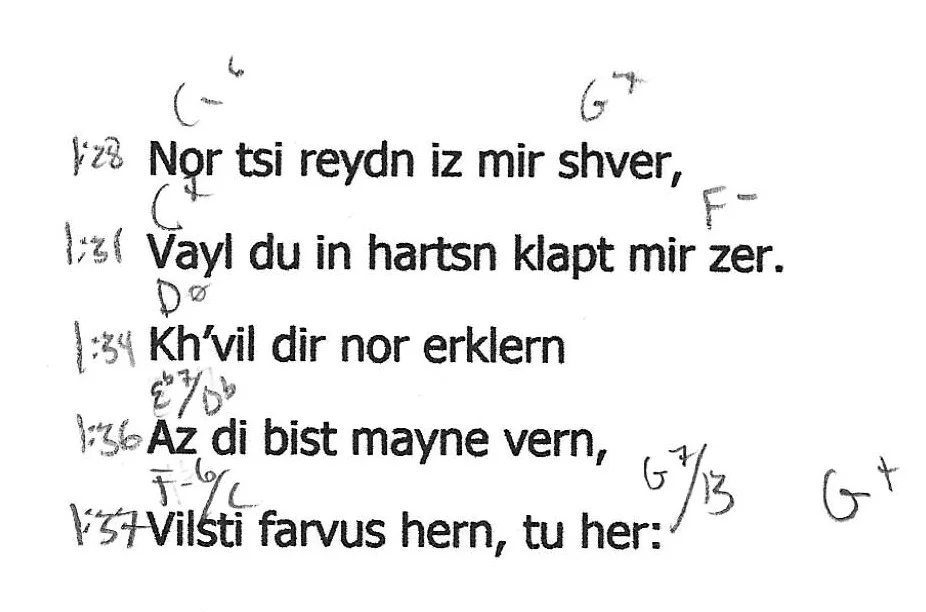In the spring of 2016, I sang with New England Conservatory's Jewish Music Ensemble. The highlight of the semester was learning the Yiddish song "Prost in Pushet" from an old recording of Yiddish pop duo The Barry Sisters.
I've sung extensively in both German and Hebrew, but this was my first venture into Yiddish. Some of my older family members speak some Yiddish, and I heard Yiddish words and phrases in my family growing up, but I had never heard an entire verse in it, and I'd never tried to say more than the occasional word, let alone sing it. Neither German nor Hebrew are known as the most "singable" of languages -- the consonants they use don't exactly roll off the tongue or out of the throat -- but I really enjoy singing in both languages, and am very comfortable in both. I thought Yiddish would just be a combination, but... not quite! It's been years since I had to practice just saying the words to get a mouth feel, but I did for this one.
Excerpt from chord chart by lyrics for "Prost in Pushet"
So how does one learn a Yiddish swing trio from a recording? Everyone has different methods; I assume if you've read this far, you're interested in learning mine.
I begin with the form, and as a singer, I base that in part on lyrics. I did have a sheet with the lyrics, thanks to inspiring ensemble director Hankus Netsky. Using the lyrics sheet as a sort of map, I figured out the chords by listening to the recording. I work extensively by ear; if that sounds difficult to you, trust me that it gets much easier after lots of study and years of practice. I assure you it was not too tricky, with this upbeat minor tune. The form is also essential - for example, I wrote in where there was a clarinet fill. Line by line, I noted the time in the recording, which helped for reference in learning the piece on my own, and in rehearsing it with others.
Excerpt from "chickenscratch shorthand" transcription
Then I transcribed both the vocal lines, in my chickenscratch shorthand. (I call my transcription "chickenscratch shorthand" because I am generally more concerned with notes than rhythms, so the notes are all accurate but many rhythms are absent - we could all pick those right up from the recording, and they weren't worth taking the time to transcribe accurately... also my rhythmic transcription can be, *ahem,* lacking.) I noted times in the recording which corresponded to specific measures: a very helpful tool when learning as well as transcribing, to be able to jump directly to a passage in the recording for reference. (For transcription and study, I use the excellent Voice Record app which allows you to bookmark spots in a recording, as well as speed it up or slow it down: a very good friend to the musician working with recordings.) After completing the transcription, I learned both the vocal lines during practice time on my own.
Then, the fun part: rehearsing with other musicians! (Well, it's all fun, really - but collaborating with other musicians brings new dimensions that I find deeply rewarding.) I began with wonderful singer Jenny Herzog, who took the top line while I took the bottom; both of our voices fit well with that division. Though the original recording is sung by a duo, we added another fantastic singer, Burcu Gulec, to the mix; in collaborative trio rehearsals, Jenny, Burcu, and I wrote a third line for Burcu. She covered the lower harmony and Jenny always took the top line, so I sang the middle voice (which is the melody here, as it generally is in a vocal trio).
After a rehearsal or two as a vocal trio, we joined the band for the whole megillah, as it were. Hankus had parts for the ensemble, very faithful to the original recording, and in no time at all, we were swinging along. We performed this piece at our ensemble performance set on April 16, 2016.
NEC 2016 Jewis Music Ensemble musicians:
Franzi Seehausen, voice
Burcu Gulec, voice
Ilona Tipp, voice
Jenny Herzog, voice
Rafael Natan, oboe/violin
Artavazd Tadevosyan, duduk
Rubin Hohlbein, trumpet
Daniel Bitran, clarinet
Zach Mayer, bari sax
Elinor Speirs, violin
Zhongjia Chen, ghuzheng
Davey Harrison, mandolin/voice
Matthew Okun, guitar
Yaniv Yacoby, percussion
Jeremiah Klarman, piano

